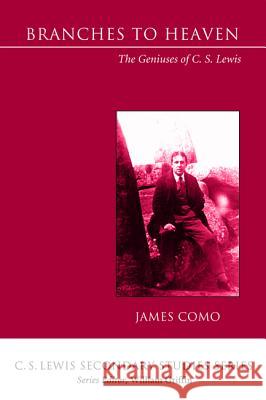Branches to Heaven » książka
Branches to Heaven
ISBN-13: 9781498238847 / Angielski / Miękka / 2015 / 246 str.
Of Edmund Spenser, C. S. Lewis wrote, ""his work is one, like a growing thing, a tree with branches to heaven and roots to hell. And in between these two extremes comes all the multiplicity of human life."" This book seeks to demonstrate the aptness of that quotation when applied to Lewis himself. From his deepest emotional and psychological landscape, to his prevailing temperament, and then to his training, Lewis marshaled his magnificent rhetorical skills on behalf of his vocation: to make Christianity a reasonable and inviting alternative to doubters. In this--and through the many genres of which he was a master--he never wavered. These are the branches--""the available means of persuasion,"" as Aristotle put it. Sources, influences, experience and his very self: these are the roots. A close look at these, with a combination of argument, critical analysis, and some fresh connections, finally yield an unexpected portrait. C. S. Lewis and his work are indeed one, with deeper roots and loftier branches than the current reputation of the master and his avuncular persona suggest. ""Professor Como is an enormously astute critic, and a scholar of immense integrity. This is a different book on Lewis. It has a substantial thesis, which is worked out with a dexterity that is a sheer pleasure to read. It is not another panegyric by a votary. It belongs on the shelf of serious twentieth-century literary criticism and scholarship."" --Thomas Howard James Como (www.jamescomo.com) is Professor Emeritus of Rhetoric and Public Communication at York College, CUNY. He holds advanced degrees in both public and group communication and in medieval English literature, and holds the PhD in Language, Literature, and Rhetoric from Columbia University. He is a founding member of the New York C. S. Lewis Society, and his writing, lectures, interviews, and documentary appearances dealing with C. S. Lewis are widely known.
Of Edmund Spenser, C. S. Lewis wrote, ""his work is one, like a growing thing, a tree with branches to heaven and roots to hell. And in between these two extremes comes all the multiplicity of human life."" This book seeks to demonstrate the aptness of that quotation when applied to Lewis himself. From his deepest emotional and psychological landscape, to his prevailing temperament, and then to his training, Lewis marshaled his magnificent rhetorical skills on behalf of his vocation: to make Christianity a reasonable and inviting alternative to doubters. In this--and through the many genres of which he was a master--he never wavered. These are the branches--""the available means of persuasion,"" as Aristotle put it. Sources, influences, experience and his very self: these are the roots. A close look at these, with a combination of argument, critical analysis, and some fresh connections, finally yield an unexpected portrait. C. S. Lewis and his work are indeed one, with deeper roots and loftier branches than the current reputation of the master and his avuncular persona suggest.""Professor Como is an enormously astute critic, and a scholar of immense integrity. This is a different book on Lewis. It has a substantial thesis, which is worked out with a dexterity that is a sheer pleasure to read. It is not another panegyric by a votary. It belongs on the shelf of serious twentieth-century literary criticism and scholarship.""--Thomas HowardJames Como (www.jamescomo.com) is Professor Emeritus of Rhetoric and Public Communication at York College, CUNY. He holds advanced degrees in both public and group communication and in medieval English literature, and holds the PhD in Language, Literature, and Rhetoric from Columbia University. He is a founding member of the New York C. S. Lewis Society, and his writing, lectures, interviews, and documentary appearances dealing with C. S. Lewis are widely known.











